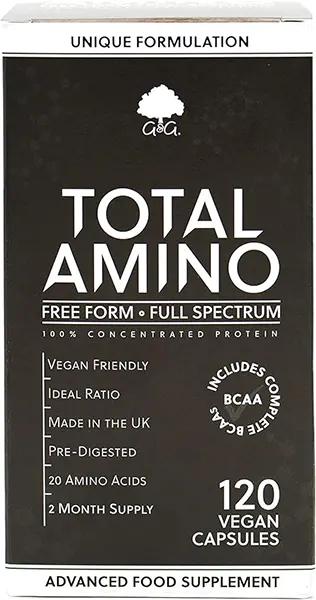Total Amino by G&G Vitamins is an Amino Acid complex supplement.
Ingredients
This complex contains all 20 standard amino acids at varying amounts :
- L-glutamic acid – 75mg
- L-glutamine – 75mg
- L-lysine – 75mg
- L-arginine – 69mg
- L-leucine – 60mg
- Glycine – 44mg
- L-methionine – 46mg
- L-phenylalanine – 36mg
- L-serine – 36mg
- L-threonine – 30mg
- L-isoleucine – 30mg
- L-valine – 30mg
- L-tyrosine – 30mg
- L-cysteine – 23.7mg
- L-histidine – 20mg
- L-alanine – 18mg
- L-aspartic acid – 15mg
- L-proline – 15mg
- L-tryptophan – 12mg
- L-taurine – 10mg
The capsule shell is made from vegetable cellulose.
Information
It contains no gluten, lactose, wheat, gmos, binders, excipients, fillers, sugar or colouring, flavouring, preservatives or animal derivatives. It’s made in the UK and comes approved for vegans, kosher certified and GMP certified.
It’s targeted for people doing workouts and advises to take 2 capsules once daily within 15 minutes of completing the workout. Otherwise it advises 1 capsule twice a day, one hour before food each time. There’s 120 capsules, providing 2 month’s supply.
Usually amino acids are sourced from animals, however this supplement is sourced from fermenting natural enzymes and provides a supplement solution for vegans and vegetarians.
Amino Acids
Amino acids are the building blocks of proteins, essential for numerous biological processes in the body, including muscle building, hormone regulation, and immune function. There are twenty standard amino acids, each with a unique structure and function, and they can be obtained through dietary sources or synthesized within the body.
People typically take amino acid supplements in order to improve their workout results.
During exercise, muscle tissues undergo stress and damage, leading to the breakdown of muscle protein. This process releases amino acids into the bloodstream to support energy production and repair muscle tissue. Consequently, prolonged or intense exercise can deplete amino acid reserves, particularly branched-chain amino acids like leucine, isoleucine, and valine, which are essential for muscle repair and growth.
Other reasons that can reduce amino acids in the body include:
- Inadequate dietary intake: Not consuming enough protein-rich foods can lead to insufficient amino acid intake, which may result in reduced amino acid levels in the body.
- Digestive disorders: Conditions such as malabsorption syndromes, inflammatory bowel disease, or gastrointestinal surgeries can impair the absorption of amino acids from the diet, leading to lower levels in the body.
- Chronic illnesses: Certain chronic diseases or conditions, such as kidney disease, liver disease, cancer, or metabolic disorders, can increase the body’s demand for amino acids or interfere with their metabolism, resulting in reduced amino acid levels.
- Stress: Prolonged periods of physical or psychological stress can increase the body’s need for amino acids, which may lead to their depletion if dietary intake or synthesis is inadequate to meet the increased demand.
- Medications: Some medications, such as certain antibiotics or antiviral drugs, may interfere with amino acid metabolism or absorption, leading to reduced levels in the body.
- Aging: As individuals age, there may be a decline in protein synthesis and alterations in amino acid metabolism, which can contribute to reduced levels of certain amino acids in the body.
Other Information
Excessive intake of certain amino acids may interfere with the absorption of other nutrients. For example, high doses of arginine can impair lysine absorption, leading to potential lysine deficiency.
Amino acids play a role in neurotransmitter synthesis, and consuming excessive amounts of certain amino acids, such as tyrosine or phenylalanine, may disrupt neurotransmitter balance and lead to mood changes, anxiety, or insomnia.
Excessive intake of certain amino acids, particularly those with nitrogen-containing side chains, can increase the workload on the kidneys or liver. This may be problematic for individuals with pre-existing kidney or liver conditions.
Common side effects can be gastrointestinal discomfort, such as nausea, diarrhea, or stomach cramps.
Summary
Most people interested in this supplement, simply want to know one thing, will this improve the results of their workouts so they can get closer to their goals. The answer is that yes this supplement will likely support you when intense exercise leads to a reduction in amino acids, especially if you’re not sourcing them from anything else. A core problem people have with workouts is eating enough to support muscle growth, and this supplement helps in that realm partly because it’s providing one of reasons for needing so much extra nutrition.
It’s common for protein powders to also include BCAAs; leucine, isoleucine and valine. These are the amino acids that are focused on muscle growth however Total Amino offers a broader range of amino acids to support various physiological processes beyond just muscle protein synthesis. Overall this supplement is for those seeking the combination of muscle recovery, overall health and well-being.
Total Amino - G&G Vitamins
Score
7/10
A good vegan/vegetarian option for the full spectrum of amino acids and good value for money.





